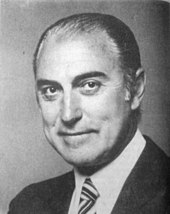Cacho Fontana
| Jorge "Cacho" Fontana | |
|---|---|
 |
|
| Born |
April 23, 1932 Buenos Aires |
| Nationality | Argentine |
Jorge "Cacho" Fontana (born Norberto Palese, April 23, 1932) is an Argentine radio and television personality.
Born Norberto Palese in the Barracas section of Buenos Aires, he was the only child of Nieves Filgueiras and Antonio Palese. He began his career in show business at age sixteen, when Jorge Loguarro, a friend and coworker who moonlighted as a stage presenter, invited him to do likewise at the Salón Argentino on Corrientes Avenue. The company hired Palese as a presenter for their traveling show, and the young man adopted his stage name: Jorge "Cacho" Fontana.
He debuted on the radio in Argentina in 1950 when a chance encounter with radio host Roberto González Rivero ("Riverito") at the Huracán Stadium resulted in his being hired as an announcer on Riverito's Peña de tango, on Radio del Pueblo. He then worked with radio theater host Julio César Barton, and as a sportscaster for Chacarita Juniors. He replaced Carlos Carella, who began career in film, at the popular El Chantecler revue and became acquainted with Argentine comedy greats Tita Merello and Luis Sandrini as a stand-in for host Jaime Font Saravia in El Relámpago ("The Thunderbolt"), where the duo starred under the direction of Miguel Coronatto Paz. Coronatto Paz later hired Fontana on a permanent basis. His first marriage, to Dora Palma, ended after two years; they had one daughter.
Fontana hosted a morning show, beginning in 1955, with María Esther Vignola and Rina Morán on Radio El Mundo. The "Fontana Show" was a success, and the show attracted prestigious producers such as Alberto Migré, Hugo Moser, Abel Santa Cruz, and Relámpago producer Miguel Coronatto Paz. He premiered on Argentine television in 1956, hosting the quiz show Odol Pregunta on Channel 7, and a talk show, La Campana de Cristal. His producer on Channel 7, Guillermo Brizuela Méndez, would become a friend and mentor to the young star. He appeared in numerous advertising spots in subsequent years, as well as in sportscasting, and would work with leading Argentine football announcer José María Muñoz during the 1966 FIFA World Cup. The Fontana Show on Radio El Mundo ended in 1967. Fontana joined Radio Rivadavia, and he and Muñoz became the station's signature football announcers during eight years. Fontana also covered boxing, and was on hand for Nicolino Locche's 1968 Light Welterweight World Championship win, as well as for Ringo Bonavena's controversial loss against Muhammad Ali in 1970. He served as chief news correspondent during the 1970 ceremony bestowing the Nobel Prize in Physiology or Medicine to Dr. Luis Federico Leloir. The Fontana Show returned on the airwaves as a four-hour, live current events and interview program. The show became known for its on-site reporting, and its host often interviewed guests in their cars with a mobile unit plugged into the cigarette lighter. The popular program helped launch the careers of Carlos Abrevaya, Adolfo Castelo, and Jorge Guinzburg, among others.
...
Wikipedia
